#feminist film writing
Text
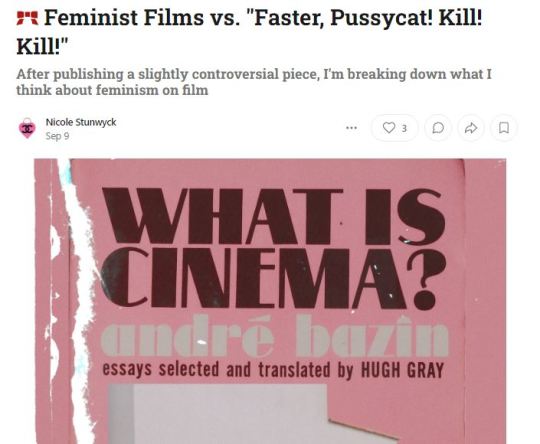


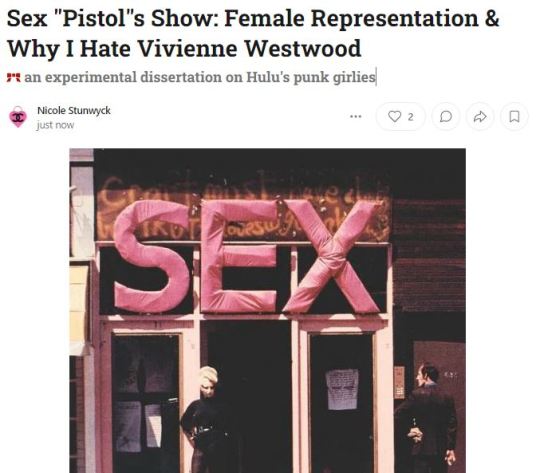
hi! i'm nicole, lady film writer & madonna scholar & blond blogger about town and these are some of my writings 🎀 all of my feminist film essays and posts r 100% free on substack and i publish a new piece weekly so consider subscribing! below some links <3 #BRINGBACKBLOGGING
Sex "Pistol"s Show: Female Representation & Why I Hate Vivienne Westwood
🎀 Feminist Films vs. "Faster, Pussycat! Kill! Kill!"
💝 5 Short Films I Recommend
the horrors of making movies as a schoolgirl 🎀
Barbie Breakfasts in Gregg Araki’s "The Living End" (1992) 🎀💝
#would mean the world if u reblogged </3#pamela rooke#feminist cinema#feminist film theory#sex pistols#pistol 2022#gregg araki#feminist film writing#woman directors#film writing#film writer
20 notes
·
View notes
Text

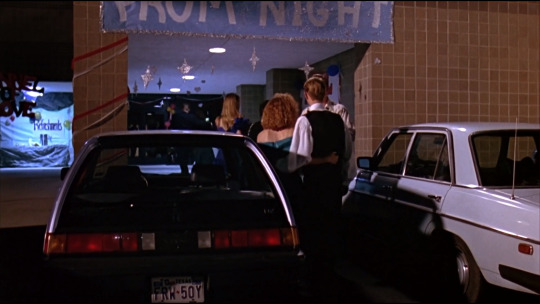


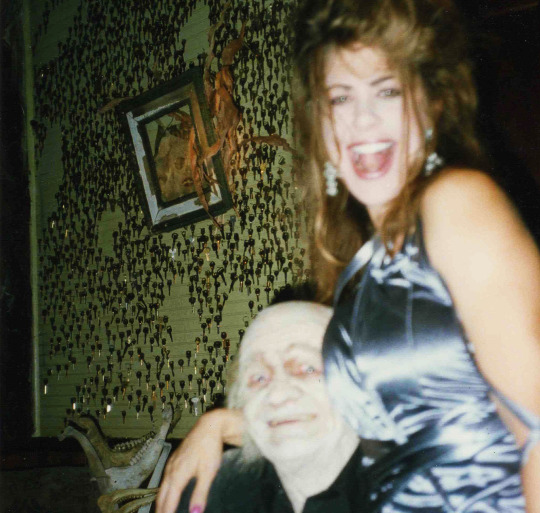


my thoughts on TCM: The Next Generation part2
#my work#feminist writing#feminist reading#Texas Chainsaw Massacre#texas chainsaw massacre the next generation#tcm#tcm the next generation#leatherface#slashers#slasher#slasher film#men women and chainsaws#horror#final girl#finalgirl#final girl syndrome#90s horror#90shorror
20 notes
·
View notes
Text
Hey remember when I mentioned I was trying to find a place to publish my 12 page essay on Bones and All? Well I finally did it and by did it I mean put it in a blog post on medium! I’m linking it below:
#bones and all#bones and all essay#luca guadagnino#bones and all movie#film analysis#meta analysis#cannibalism#essay writing#essay#feminist analysis#queer theory#queer film analysis#postmodernist feminist theory#feminist theory#queer film#eucharist#cannibalism as sex#cannibalism as a metaphor for love#cannibalism as the Eucharist#not not tlt#not tlt
6 notes
·
View notes
Text
men hate.
men hate women who are too loud
too quiet
too big
too small
too girly
too boyish
too confident
too shy
men hate women they fuck
women they can’t fuck
women they have yet to fuck
women they have fucked before
men hate women in magazines
in tv shows
in movies
in real life
in their own imagination and dreams
men hate sluts and whores and girls who give it up too easily. women who are loose and are past their prime
men hate frigid bitches and dykes and women who tell them no
men hate women.
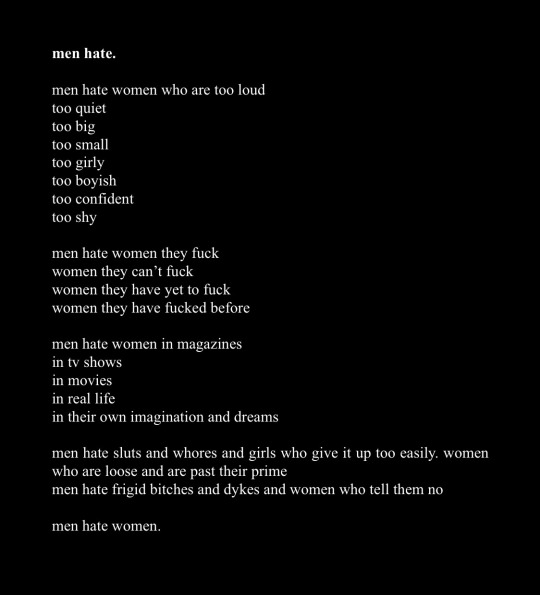
#poem#poems#poetry#young poets#poem society#words#writings#ramblings#short poems#poets on tumblr#imaginary diary of the protagonist in a horror film#hashtags for poets#feminism#feminist poetry#feminist poem#femcel#gaslight gatekeep girlboss#female manipulator#girlblogger#girlboss#fuck men
67 notes
·
View notes
Text
i will say that the way poor things handles disability and disfigurement left a bad taste in my mouth
#i saw demi adejuyigbe write abt how it resonated with him through an autistic reading which i do think is cool#but idk something abt how and when we are supposed to empathise with intellectually disabled ppl#i get it i get that its allegorical and what not but idk something abt the only happy ending for disabled ppl#being a miraculous cure or death yknow#i understand it was a child brain and im being literal but idk#just the times that her mannerisms and behaviour earlier in the movie is played for laugh and how her happy ending is being smart#and needing no carers or helpers#so haha fuck you to remy youssef for calling her an ableist slur at the beginning#now shes his boss!!#its just very white and palatable#they would not make a movie like this with a less conventionally attractive lead bc ppl would just be grossed out#bc you can't act the way emma stone acts at the beginning of the film and not be bangable#the story is written around a conventionally attractive woman it wouldn't work if the person casted was less desirable#but tbh that is my problem. not just with this movie just like all of the big 'feminist' adjacent movies & tv shows of late#*played for laughs. look i make typos constantly i am bad at smartphones despite being a part of the smartphone gen
2 notes
·
View notes
Text
Breaking Down the Bold Finale: Why Promising Young Woman Nailed It
Hey, fellow film lovers! Promising Young Woman (2020) is one of my all-time favourite movies and for good reason. It discusses important topics about society and femininity.
Let’s dive into the jaw-dropping finale of Promising Young Woman. Buckle up for a chat about film theory and why that ending is a knockout.
Feminist Film Theory: Power to Cassie
In the realm of feminist film theory, Cassie is our unapologetic protagonist. She emerges as an avenging hero, shattering the conventional narrative. The ending? It had to be bold, reflecting Cassie’s relentless pursuit of justice.
Cassie, portrayed with depth by Carey Mulligan, challenges the typical female character arc. The tension and power dynamics unfold in scenes where she confronts her targets.
The ending becomes a powerful statement. It breaks away from traditional gender norms. The ending also offers a fresh perspective on justice in the face of sexual assault.
Genre Deconstruction: Twisty Turmoil
Now, let’s talk about genre deconstruction. Promising Young Woman begins as a dark comedy. Before long, it morphs into a thrilling tragedy. Why? To keep us on our toes. The ending is unconventional because life itself is messy, and so is this story.
The film’s ability to blend dark comedy with thriller and tragedy is intentional. Shaking up genre expectations makes us question our assumptions about justice and morality. The ending isn’t neatly packaged, but a deliberate departure from the expected.
Visual Language: Colors Speak Louder
Have you noticed those dreamy pastel colours during Cassie’s confrontations? These pallets act as eye candy AND visual storytelling. The ending needed to be a spectacle.
The filmmakers used colours to challenge societal perceptions and scream empowerment. Pastel colours in confrontation scenes add layers of irony. The pallet challenges traditional notions of femininity.
This visual language enhances our understanding of the film’s themes. It adds depth to the ending, making it an interplay of satisfaction AND discomfort.
Dialogue as Subtext: The Unsaid Speaks Volumes
Cassie’s exchanges, especially with characters like Ryan, are dripping with subtext. The coffee shop confrontation? It’s a dialogue masterpiece, wrapping up Cassie’s journey with emotional weight.
Film theory teaches us that dialogue isn’t just about words. It’s also a hidden treasure trove of meaning. We can especially focus on lines leading to the film’s climax.
Let’s talk about THAT line in one of the ending scenes, where Cassie shows up as Candy.
Al Monroe: It’s every man’s worst nightmare, getting accused of something like that.
Cassie: Can you guess what every woman’s worst nightmare is?
Now that’s a kicker.
Al Monroe, played by Chris Lowell, reveals a common sentiment among men. He expresses fear at the thought of a woman accusing him of a heinous act.
Cassie’s retort brings the film’s feminist themes to the forefront. It challenges Al and, by extension, the audience.
Men may fear false accusations, but women live with the constant threat of sexual assault. They face the fear of no one believing them or taking them seriously.
Cassie’s response is a stark reminder of the gendered nature of societal fears. Her line put a spotlight on the systemic issues surrounding sexual assault. These types of lines prompt viewers to confront the disparity in societal expectations.
Cassie’s question is a rhetorical challenge, urging the audience to reconsider their ideas. The line encourages the viewers to empathise with the lived experiences of women. This dialogue lingers, forcing viewers to confront uncomfortable truths about sexual assault.
Catharsis and Disquiet: Emotional Rollercoaster
As we approach the finale, that mix of satisfaction and disquiet isn’t accidental. Film theory says it’s purposeful. The ending brings catharsis, a release, but it also nudges us to question more. It’s a rollercoaster designed to make us think.
The emotional impact of the ending is intentional. It prompts us to reflect on our own expectations and biases. The ending pushes us to confront uncomfortable truths about justice and societal expectations.
The film doesn’t spoon-feed us a tidy resolution. Instead, it leaves us with a cocktail of emotions. It sparks conversations long after the credits roll.
A Cinematic Rebellion
In a nutshell, Promising Young Woman chose its ending for a reason. Feminist film theory empowered Cassie. Genre deconstruction kept us guessing. The visual language uses colours to challenge norms. Dialogue spoke volumes.
The ending delivered catharsis and disquiet, leaving us with thoughts to ponder. This film isn’t just a movie. Promising Young Woman is a conversation starter. This film challenges norms and sparks discussions about justice and revenge for women.
That’s why the ending had to be a spectacle.
Promising Young Woman shows a cinematic rebellion against the norm. Through feminist film theory, genre deconstruction, visual language, and dialogue analysis, the film crafts an ending as bold as its protagonist.
#my writing#creativepotatowrites#writeblr#promising young woman#promisingyoungwoman#filmblog#filmessay#movie#film blog#film essay#feminism#feminist theory#film theory
2 notes
·
View notes
Text
Social justice, shipping, and ideology: when fandom becomes a crusade, things get ugly
by Aja Romano for Vox
“Shipping is as old as fandom itself. But traditionally, fans never expected their particular pairing to "become canon" — that is, to officially happen on a show or in a storyline. In modern fandoms, however, fans of movies and TV shows often root for their ships to become canon the way sports fans root for their teams. If the football fans’ goal is to see their team win the Super Bowl, the shipper’s goal is to see their ship "win" by entering the narrative as an official storyline.
These shippers collectively form group narratives about their favorite ship. More and more, these group narratives are evolving into unshakable belief systems that usually take one of three increasingly common forms:
1) The belief that the ship in question is unquestionably going to become canon
Historically in fandom, liking a ship meant just that: You liked a ship. Anything more than that would get you a lot of side-eyeing. In the Harry Potter fandom, the advent of Ron and Hermione becoming a couple in the sixth book led to a very famous (and still ongoing) meltdown among Harry/Hermione shippers.
At the time — fandom in 2005 — their unwavering faith that Harry/Hermione would eventually become canon was widely seen by fandom at large as extreme, because shipping was typically viewed as something that existed outside of canon and generally had no particular relationship to the course of canon at all.
Today, expecting your ship to become canon is more or less the norm. But there are lots of complications with this line of thinking. Even if a ship does become canon, it might not become canon in a way that fans like — Buffy/Spike, anyone? And of course it might not be guaranteed to remain canon. Breakups happen, actors leave shows, and, as The 100 fans were brutally reminded earlier this spring, characters die.
Serial narratives are fueled by drama, and they often create that drama by shaking up character relationships. Happily ever after is a rarity for couples in fictional stories, at least while they’re still in process. But fans pushing for their ships to become canon are typically looking ahead to what they call "endgame" — they believe that when all is said and done, after all the drama, their ship will, essentially, be the one that comes out victorious. Generally, they consider any alternative to be unpardonable.
Clinging to this kind of all-or-nothing view of a character pairing is, in general, a recipe for massive disappointment.
2) The belief that the ship should become canon because it involves an underrepresented identity
Fans of ships involving queer characters, characters of color, disabled characters, and other drastically underserved identities often lobby creators to acknowledge and embrace the validity of their ships. They frequently cite the sad but widely observed fact that characters who fall within these underserved identities rarely get to have meaningful canonical relationships written about them.
The problem with explicitly linking shipping to this kind of political platforming and social justice activism is that these arguments are often self-serving — that is, they’re more about having a specific ship become canon than about achieving social progress.
#GiveCaptainAmericaABoyfriend is a recent fandom trend directed at Marvel creators, but even though many Avengers fans have used it to advocate for general queer representation in the Marvel universe, the vast majority have used it to advocate for a specific ship — Stucky, or Steve/Bucky: Captain America shipped with his lifelong best friend.
Conflating ships that involve underrepresented identities with the desire for inclusion gets especially dicey when it leads fans to prioritize support for their ship over other intersectional concerns. For example, in Teen Wolf fandom, fans of the "Sterek" ship (Derek/Stiles) have frequently accused the show of "queerbaiting," or exploiting their specific queer male pairing without any intention of following through on it — even though the show’s creator, Jeff Davis, is a gay man who has already inserted several queer relationships in the show’s storylines, and even though Sterek, as it currently exists within canon, is a physically abusive relationship.
The prioritization of a ship at the expense of other intersectionality concerns is also present on The 100, which earlier this year featured a queer canonical relationship between main character Clarke and the warrior queen Lexa, a.k.a. Clexa. Clexa fans have been so focused on advocating for Clexa — even after the ship effectively ended with Lexa’s untimely death — that they’ve come under fire for ignoring the many elements of the show that some fans feel are racist and problematic.
In these and many similar cases, one might wonder if a given show’s overall progressiveness matters less to ideologically driven shippers than the ship itself.
3) The belief that the ship is already canon but the creators are unable or unwilling to confirm or admit it
This belief argues that the people in charge of the narrative are deliberately concealing the "truth" about a relationship. Because it involves an official cover-up, this particular ideological thread is particularly well-suited to ships involving real people (real person fiction, or RPF) and ships involving fictional queer characters. It almost always escalates into outright fandom conspiracies, especially if the ship involves a (perceived) real-life relationship between two same-sex celebrities.
Perhaps the most notable example of this kind of deep fandom conspiracy is the great Larry Stylinson conspiracy in the One Direction fandom, followed by TLJC in the Sherlock fandom and swaths of conspiratorial RPF shippers in numerous other fandoms, from Supernatural to Twilight to The X-Files.
The obvious problem here is that, like all good conspiracy theories, those built on the insistence that a pairing is real but secret are designed to explain away every contradictory bit of "evidence" that a pairing isn’t real. And like all conspiracies, this level of shipping can lead to hardcore, alienating belief systems.
Ships often involve a combination of these three basic branches of belief. For instance, Harry Potter’s Harry/Hermione shippers believed their ship represented a philosophical approach to love and Harry Potter as a whole. And Sherlock’s Johnlock conspiracists consistently point to the progressive nature of their ship as a reason for its inevitability. As one fan put it, "What a minority of LGBTQIA viewers label as ‘queer baiting’ is but a tool that serves the slow narrative of how Sherlock Holmes and John Watson finally end up in a relationship."
Of course, combining these three ideological strains serves to make the overall shipper ideology that much stronger — and that makes interactions within and between different ideologies that much more fraught.
When shipping is treated as an ideology, it creates deep tensions between fans and creators
These days, because so many fans treat shipping as a serious matter of urgency, they tend to approach the fan-creator divide feeling utterly justified in their belief that a ship will be or should be canon. Yet creators and writers generally have no idea what kind of belief system has amassed around a ship until members of that ship approach them to try to discuss it.
When a single fan or a group of fans tweet at creators asking whether a ship will become canon, creators generally aren’t aware of the tremendous amount of background attached to said ship — the thought, speculation, love, emotional investment, and collective justification that has gone into a fandom’s perception of a pairing.
Creators and other cast and crew members who interact with fans tend to get asked basic questions like, "Will this ship be endgame?" But most can't answer, and often don't even know, because of the many factors involved in producing a storyline.
In other words, the creators are seeing only the tip of the iceberg that is a fandom's investment in a ship, and fans are seeing only the tip of the iceberg that is the behind-the-scenes production of the canonical storyline.
Add in the fact that both fans and creators usually believe they can see the whole iceberg, and the result is inherent miscommunication. Fans might come away feeling like creators are being evasive or brushing off their need to have their ship to be canon; creators might come away feeling like fans are placing too much emphasis on a single aspect of the plot at the expense of everything else they’re trying to do within a storyline.
This disconnect can lead to feelings of resentment on both sides. It can also lead to creators accusing fans of wanting to control their narratives.
The rise in ideological fan beliefs is less about control and more about equal partnerships
The modern state of fandom involves an uneasy imbalance between fans and creators. The two groups both encourage each other creatively but lack a mutual partnership and mutual understanding of how fans’ collective creation might contribute to a storyline.
Though it would have been taboo in the past, fans who engage with creators in 2016 tend to assume they’re on equal footing with those creators, thanks to their role as active consumers of the narrative: Here is what we want your TV show to do for us, the paying customers who watch it.
But creators tend to engage with fans via a top-down approach. They are still viewing themselves as the powers that be, the ones in control, even if the fans aren’t. This is how we wind up with the kind of supreme disconnect between fans and writers like the one that has existed between Supernatural and its fan base for most of the show's interminable run on air: A substantial number of the show’s fans are collaboratively creating a vision of a completely different show than the one being produced in the writers’ room.
It's possible that shipping as ideology has arisen in part because of these imbalanced power dynamics with creators. After all, if you’re worried the creators won't listen to you, or won’t consider what you have to say as equivalent to their own opinion, what better way to justify what you have to say than to package it not as once-shameful fan desire, but as ideology?
It’s easy to stand back from fandom and point to shipping behavior as a hallmark of fan entitlement. But it would be far more accurate to say that shipper ideology is ultimately about fans trying to find a way to gain equity with creators, to work with them in a tacit collaboration.
There’s no easy answer to this dilemma, but awareness is a start
For creators who are winging their interactions with fans, knowing when a ship has become a collective fandom ideology, and why, might help give you a bit of autonomy from your fandom. At the very least, it might help you remain neutral in your presentation of various ships and plot points and avoid unexpected pitfalls.
Meanwhile, for fans feeling fatigue over an embattled struggle to make a ship canon, and the crushing disappointment of setbacks or failure, it might help to remember that ships don’t have to be canon in order to be transformative and meaningful on both a personal and cultural level. Look at Star Trek’s Kirk/Spock: that ship never became canon, but it remains one of the most compelling ships ever created, and within canon it gave us one of pop culture’s most enduring symbols of love — their hands touching through the glass.
Henry Jenkins famously said that queer fanfiction "is what happens when you take away the glass." And, sure, it’s increasingly possible that savvy creators might go ahead and take away the glass for us. But that doesn’t negate the power of fans being able to do it on their own, without anyone’s help.
Shipping is exciting, fun, and often a progressive and empowering experience. And if a ship ultimately becomes canon, so much the better. But when shipping becomes an ideology, tantamount to a religion, it makes a story’s creators pretty much tantamount to gods. In essence, even though that level of shipping may grow out of a wish to maintain parity with creators, it’s ultimately de-empowering to fans, making them dependent on creators for validation.
But fans are validated through their love for the source material; they’ve never needed more than that. Turning that source material into a game to be won only turns all involved players into winners and losers.”
#long post#fandom problems#i've been having a lot of feelings the past month or so about shipping and modern tastes#ever since the release of heartstopper#which i found to be a horrendous and gimmicky netflix rainbow flag cash grab#with stilted performances and absolutely zero nuance#and everyone's obsession with it has had me feeling so lonely#alongside a real alienation from tv and movie critics positive reviews for these basic-ass gay films and shows#there's a certain strain of fandom that obsesses over ships and the reproduction of familiar tropes without any subversion#and they don't seem to have any interest in anything beyond that#except maybe a weak pop feminist take#which is fine i guess#and that strain did free me to focus on my emotional experiences to stories that opened the whole world up to me#but i also need and relish the motifs and themes and craft and philosophies that go into a work#i love to start to understand my emotional reaction and where it came from#and experience feelings from stories beyond *squeeeeee*#and there's so little of that work in fandom#It makes me want to go into academia but i honestly doubt it would be any better and I really don't want to write papers professionally lol
79 notes
·
View notes
Text
she’s a 10 but she has parasocial relationships with disney characters
#was too scared to put this on my main LMAO#but anyway for one of my classes my professor is asking us over the weekend to ponder what it means to be a princess#using the disney princess films as a blueprint#and like due to all the rachel zegler snow white drama she’s creating for herself I’ve seen a lot of people#make really valid arguments in defense of the disney princesses esp the classic ones#so I am even more well equipped to argue a case for them#and there’s this one person in my class who is so annoying and seems like they would probably take on the pseudo-feminist idea of like#the classic princesses being weak bc they seek domesticity or true love#which in most cases is just blatantly not true#anyway I could write a thesis about this topic and I will be exercising some of that argumentative power on Monday if I have to
3 notes
·
View notes
Text
Harry styles does movie interviews the same way he does songwriting.... Poorly and with little payoff
#If you need like 5 writers for the most basic disorganized brain vomit type writing chances are you're not a great writer#I feel for Chris 'English bachelor/reads feminist theory for fun' pine someone pls save him 😭😭#'my fav thing abt the movie is it feels like a movie' he sounds like a drunk guy trying to have a conversation after one too many drinks#I don't even go here again I just like being a hater#Like mf are you serious 💀💀😩#don't worry darling#venice film festival#On a better note can we PLEASE talk any brendon Fraser getting a standing ovation instead can we change topic ffa#harry styles#Yeah I'll tag it Idc#wow anna said something#anna's shitposts#Edit: and movies as a whole for that matter mf got 12s and now he's a lead amongst a list professional actors? Gtfo...
11 notes
·
View notes
Link
Here’s some money, go see a P*rn War. This week we’re going on a field trip to Times Square with Nona Willis Aronowitz, author of Bad S*x, to learn about Deep Throat, “p*rn0 chic,” and the unresolved feminist battle over whether to eradicate p*rnography or make more of it. Digressions include Carol Clover, this discovery of the cl!toris, and Harry Reems (Joel Reems’ distant cousin).
#podcast#podcasts#you're wrong about#1970s#1980s#misogny#feminism#feminist writers#feminist writing#feminist#Patriarchy#violence#Nona Willis Aronowit#cultural critique#cultural criticism#Society and Culture#pop culture#culture#film#film history
2 notes
·
View notes
Text
been rewatching gone girl to harvest audio for a truly inadvisable shitpost and like. 8 years of hindsight really changed how i see the story lmao the cool girl monologue is possibly the least interesting thing about this film, even less interesting when taken out of context.
#it's one thing to be 15 and enamoured with rosamund pike#another entirely to be 24 and have actual cultural context for everything that's happening#i don't think we're supposed to take amy at her word#especially not when her FeministTM monologue comes at the expense of random women minding their own fucking business#this is not me cancelling amy dunne she did it to herself it's great and i do love the film still#just for very different reasons!#loose thoughts include: there's no woman amy dunne can be other than a white woman#and claiming her monologue as a universally feminist passage is pure bullshit#but it's still relatable. why is it relatable?#current hunch is that whiteness is the paragon of Cool Girl indispensable to Cool Girlness#and we are taught to aspire to that. at least its signifiers#it's also about writing and about telling stories about our own damage#in a very fun self recursive way. the monologue enables this#you can't write without immediately trying to narrativise#and that's a sort of lying extrapolated and exaggerated by amy dunne's absolute batshit cringefail odyssey#repackaging trauma for consumption is inadvertently a sort of lie#narrative-making just isn't compatible with the mundanity of the truth#we can't agree with amy without endorsing the spectacle of white rich victimhood#incredible fucking turn. also i really didn't know shit at 15 huh#sorry babe i know you would have hated to hear this
5 notes
·
View notes
Text
Truths that Co-Exist
Barbie (2023) is a giant product placement that profits off nostalgia.
The writing is profound and life-changing and understands why we seek nostalgia in a way most nostalgia-driven entertainment doesn’t.
The film is self-aware about how even now, Barbie dolls set incredibly unrealistic beauty standards. Their “body diversity” does not even scratch the surface of what that phrase really means. I don’t expect this to change.
The film still made a beautiful statement with the scene on the bench about how societal beauty standards are narrow and restrictive! And that beauty comes from experiencing life and the marks it leaves on you!
Its feminist statements are validating. Many of us see our reality onscreen, and the great thing is that it includes how cishet men fall down a pipeline of toxic hypermasculinity. It also shows the solution, and allows men to express themselves despite what society expects them to be.
The film is a capitalist venture.
The cast (aside from the leads) and crew were probably overworked and severely underpaid during filmmaking.
We can still appreciate that something fun was made, and we all made another wonderful memory where we and our loved ones went to the movies color-matching in pink.
We should not feel guilty about seeing ourselves in this film.
Meanwhile, support the WGA and SAG-Aftra strike.
#i am kenough#barbie#barbie 2023#i have a lot of thoughts about this film but i had fun#ken#barbenheimer#barbie movie#margot robbie#ryan gosling#i wanted to sob at seeing simu liu having fun onscreen tbh#tears falling like peridots
15K notes
·
View notes
Note
someone described oppenheimer as « tar for the boys » would you agree?
My brother described it as a bunch of men Barbie would commit manslaughter to and I cannot imagine it any other way
#liked the movie btw#but I saw barbie first#seeing a feminist film#that stresses the feminist message#and male ego#you will notice these things#and how insufferable those men might be#especially since Nolan really can’t write women
1 note
·
View note
Text
well i watched promising young woman for the first time and i hated it
1 note
·
View note
Text


Parts from a work in progress. My brain is sifting through the immensity of my creative desire as we speak. More to come ✨🐇
1 note
·
View note
Text
The fact that Lisa Frankenstein barely passes the Bechdel test and yet holds the most feminist themes really goes to show all you truly have to do is write authentic female characters who women and girls can relate to make a “feminist film”
557 notes
·
View notes